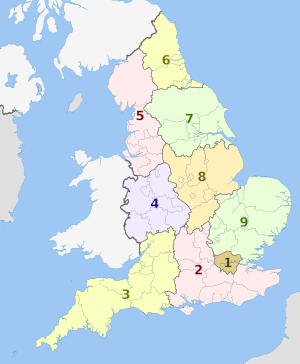Regions of England facts for kids
In England, a region is a special area that helps organize how the country is run. These regions are also called Government Office Regions. Think of them as the biggest way England is divided up for local government. They help manage things like planning and development across large parts of the country.
Contents
What Are England's Regions?
England is split into nine main regions. Each region covers a big area and includes many cities, towns, and villages. These regions help the government work with local communities on important projects.
Here are the nine regions of England:
- Greater London
- South East
- South West
- West Midlands
- North West
- North East
- Yorkshire and the Humber
- East Midlands
- East of England
Why Do We Have Regions?
Regions were created to help the government work better with different parts of England. They allow for plans and decisions to be made that fit the specific needs of a larger area, rather than just one small town. For example, a region might work on big transport projects or economic plans that benefit many local areas within its borders.
How Regions Help Local Government
Local government means the councils and groups that manage services in your local area, like schools, roads, and parks. Regions act as a link between the national government and these local councils. They help make sure that plans for things like housing, jobs, and the environment are coordinated across a wider area.
History of England's Regions
The idea of these regions started in 1994. They were set up to help coordinate government activities across England. Over time, their exact roles have changed. For example, some of the offices that managed these regions were closed in 2011. However, the regions themselves still exist as a way to understand and organize England's geography and how different parts of the country are managed.
See also
In Spanish: Regiones de Inglaterra para niños
 | Victor J. Glover |
 | Yvonne Cagle |
 | Jeanette Epps |
 | Bernard A. Harris Jr. |


